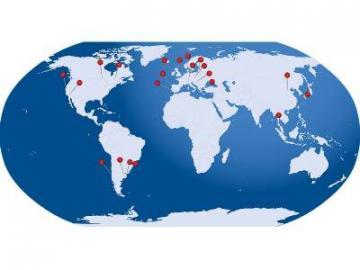COVID-19: UFES provides support for Brazilian students abroad and international students at UFES

Published at www.ufes.br on March 31st 2020 at 4:59pm
UFES, through its International Office (SRI), has been supporting its students and professors who are studying abroad, and foreigners who are developing activities at UFES. The activities began in January 2020, when the COVID-19 outbreak started in Europe.
In total, 34 undergraduate students and 20 graduate students from UFES are studying abroad (mainly in Europe) and 98 international citizens are studying at UFES.
“Universities abroad have been notifying UFES since January in relation to the possibilities for students and professors, whether to stay or to return to Brazil. Only three students decided to return from Portugal and they were enrolled in their courses, with the support of the Undergraduate Office (Prograd) of UFES. Others decided to stay in their countries, following confinement rules and studying in accordance with the decisions of each institution, whether they are e-learning options or suspension of in-person activities” said the Head of the International Office, Patricia Cardoso.
She also said that SRI has been contacting partner institutions in relation to the preventive measures and the support available for international students. She states that exchange students are responsible for their decision to return to Brazil or to stay abroad, and UFES is responsible for providing support in communications with universities that welcomed the students and for contacting the authorities of the Brazilian Ministry of Foreign Affairs (MRE) abroad.
Brazilian students abroad
Gabriel Roccon is one of the undergraduate students abroad. He is a Geography student at campus Goiabeiras and he took part in an internship program (6 months) at the University of Massachusetts, located in Quincy, where he decided to stay. “I came here to stay for a semester and, although study rooms are closed, I decided to stay here because the studies go on and here we have a good infrastructure and health insurance”, he said.
He decided to stay in the USA because in-person classes might return, although it was decided that the full semester would be developed online. “I am attending classes online, without access to some of the materials that I would need, because facilities are closed, including the library. I hope that, by June, when I am planning to return, I may get to know this region”, he added. Roccon has been contacting SRI, to whom he informed about his decision.
Another student who decided to stay abroad is João Luiz Fonseca, a doctoral student in Animal Biology, developing part of his studies at the German Primate Center “Deutsches Primatenzentrum” (DPZ), in Göttingen, central Germany. “We are safe and following the local safety rules, which restrict movements of people and the operation of commerce. The institute where I am developing my activities will remain closed until April 20th, but I am working from home”, he said.
Fonseca arrived in Germany in August 2019 and he plans, during a 1-year exchange program, to sequence the genome of howler monkeys affected by yellow fever in the state of Espirito Santo. “I am waiting for the samples from Brazil to analyze them, but we depend on the authorization of Ibama [the Brazilian Institute for Environment and Natural Resources] and the equivalent institute in Germany. I am discussing with my supervisor the possibility of extending my stay here”, he added.
International students in Espirito Santo
International students at UFES are also being advised about COVID-19 in Espirito Santo and informed about the activities at UFES. In total, there are 98 students from 33 countries and 36 of them arrived in Vitoria in the first semester of 2020. The most important information is being translated to English, in order to facilitate comprehension and SRI also created a guide with frequently asked questions (FAQs) for this audience, available at the website of SRI (internacional.ufes.br).
Information is also publicized through social networks and WhatsApp, in case of emergency. “Professor Thiago Prado (Nursing), head of the Division of Incoming Mobility, represents SRI in the Emergency Operative Committee (COE-UFES) and has been contacting these students”, Patricia added.
One of these students is Oscar Jhony Villa Ramírez, from Colombia, who started his master’s degree in the Graduate Program of Literature. He said that he has been contacting his relatives in Colombia, where social distancing was also recommended, as well as in Brazil. “My family and I are following the distancing and receiving support from UFES through SRI. I will stay in Brazil because this master’s degree is a priority to me”, he stated.
Among the international audience, there is a group of students who are enrolled in a preparatory course for the Portuguese proficiency test offered at UFES. Students selected to study in Brazilian universities through the PEC-G program (program for undergraduate students through agreements) are enrolled in such course. The course is called “Pre-PEC-G” and it is offered before the test to receive the Certificate of Proficiency in Portuguese for Foreigners (Celpe-Bras).
Until now, the Celpe-Bras test is scheduled for October and the Pre-PEC-G teachers from UFES are preparing activities for the students to learn at home, during the suspension of in-person activities. Most of these students did not speak Portuguese in the beginning of this course.
By Lidia Neves
Editor: Thereza Marinho
Translator: Felipe Guimarães
